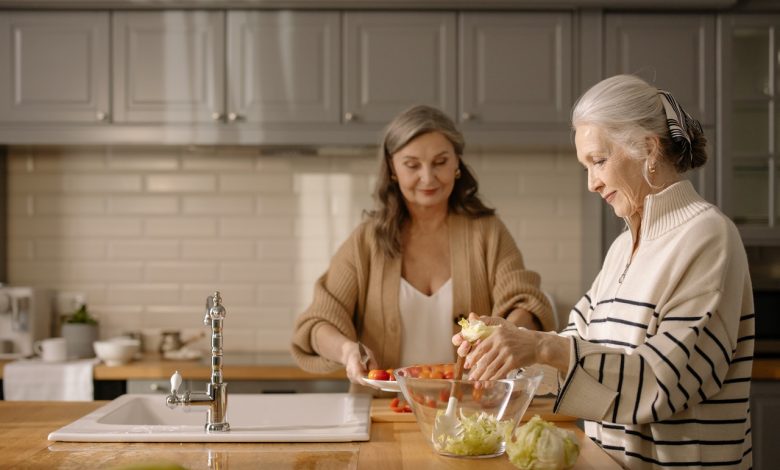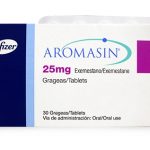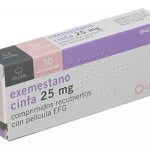Foods to Avoid When Taking Aromasin (exemestane)

For most people, taking a new medication may mean switching up your lifestyle a bit and that includes the foods you eat. A food-drug interaction means that a specific nutrient or compound within the food changes the way your body metabolizes the medication, and this can either enhance or reduce the dose your body gets, according to Johns Hopkins Medicine. The potential results: an increased risk of side effects, many of which can be dangerous, or the drug not working as it was intended.
Before introducing a medication, ask your pharmacist about any food interactions, including with alcohol, and any adjustments you may have to make to your diet.
What is Aromasin (exemestane)?
Aromasin (exemestane) is an aromatase inhibitor approved by the U.S. Food and Drug Administration (FDA) to treat:
- postmenopausal women diagnosed with hormone-receptor-positive, early-stage breast cancer after they’ve taken tamoxifen for 2 to 3 years to reduce the risk of the cancer coming back.
- postmenopausal women diagnosed with advanced-stage or metastatic hormone-receptor-positive breast cancer.
Women stop taking tamoxifen when they start taking Aromasin (exemestane).
Aromatase inhibitors can’t stop the ovaries from making estrogen, so aromatase inhibitors are mainly used to treat postmenopausal women. But because aromatase inhibitors are so much more effective than tamoxifen in postmenopausal women, researchers wondered if there were a way to successfully treat premenopausal women diagnosed with hormone-receptor-positive, early-stage breast cancer with an aromatase inhibitor. Results from the SOFT (Suppression of Ovarian Function Trial) study published in 2015 suggest that premenopausal women diagnosed with hormone-receptor-positive breast cancer can be successfully treated with Aromasin (exemestane) if their ovarian function is suppressed. If you’re a premenopausal woman willing to take medicine to suppress your ovaries, you may be able to take Aromasin (exemestane) instead of tamoxifen for your hormonal therapy treatment.
How should I take Aromasin (exemestane)?
Take Aromasin (exemestane) exactly as prescribed by your doctor. Follow all directions on your prescription label and read all medication guides or instruction sheets.
Aromasin (exemestane) is usually taken once per day, after a meal. Try to take the medicine at the same time each day.
You will need frequent medical tests. Your doctor may have you take extra vitamin D while you are taking Aromasin (exemestane). Take only the amount of vitamin D that your doctor has prescribed.
Use Aromasin (exemestane) regularly to get the most benefit. You may need to keep taking this medication for up to 5 years.
Store in the original container at room temperature away from moisture and heat.
What happens if I miss a dose?
Take the medicine as soon as you can, but skip the missed dose if it is almost time for your next dose. Do not take two doses at one time. Get your prescription refilled before you run out of medicine completely.
What happens if I overdose?
Seek emergency medical attention or call the Poison Help line at 1-800-222-1222.
Foods to Avoid When Taking Aromasin (exemestane)
The following have been found to increase aromatase or estrogen or to reduce the effectiveness of Aromasin (exemestane) and should be limited or avoided during treatment with Aromasin (exemestane):
Alcohol: It’s best to avoid or limit alcohol intake when using breast cancer medications like Aromasin (exemestane). Alcohol can raise your risk of experiencing side effects from Aromasin (exemestane), such as hot flashes or joint pain.
Beef: Some studies have shown that red and processed meats may increase estrogen in the body, so limiting these foods may support estrogen regulation and enhance the effectiveness of Aromasin (exemestane).
Chamomile tea: German chamomile might act like estrogen in the body. Exposure to chamomile can worsen hormone-sensitive conditions like breast cancer, uterine cancer, ovarian cancer, endometriosis, or uterine fibroids and limit the effectiveness of Aromasin (exemestane).
Corn oil: The inclusion of corn oil in the diet increases the levels of cholesterol, progesterone, estradiol, and insulin. You should avoid corn oil while on Aromasin (exemestane).
Grapefruit: Grapefruit & grapefruit juice should be avoided while on Aromasin (exemestane). Preliminary evidence from animal studies shows that grapes may have an aromatase-inhibiting effect, decreasing estrogen synthesis and increasing androgen precursors.
Smoked meat or fish: Meats cooked at high temperatures, as are grilled, barbecued, and smoked meats, have long been associated with carcinogenic chemicals like polycyclic aromatic hydrocarbons.
Lemons & limes: Limes are a rich source of plant estrogens called isoflavones which can influence your levels of estrogen and affect how Aromasin (exemestane) works.
Safflower oil: Fats in the diet, such as those found in safflower oil, are essential for hormone regulation and memory. But they can also influence hormonal balance so it’s best to avoid them while on Aromasin (exemestane).
Soy Bean products: Soy protein isolate, soybean oil, soybean paste, and other soybean products should be avoided while on Aromasin (exemestane). Soy is unique in that it contains a high concentration of isoflavones, a type of plant estrogen (phytoestrogen) that is similar in function to human estrogen but with much weaker effects. Soy isoflavones can bind to estrogen receptors in the body and cause either weak estrogenic or anti-estrogenic activity.
Sunflower oil: Sesame and sunflower seeds are among the highest of all estrogenic foods, consuming oil from these seeds while on Aromasin (exemestane) can negatively affect how this medication works.
Caffeine: Caffeine-containing foods like coffee, black teas, and energy drinks should be limited or avoided while using Aromasin (exemestane). An NIH study shows caffeine consumption is linked to estrogen changes. Moderate caffeine intake was associated with higher levels for Asians, lower for whites. However, white women who consumed 200 milligrams or more of caffeine a day had slightly lower estrogen levels than women who consumed less.





